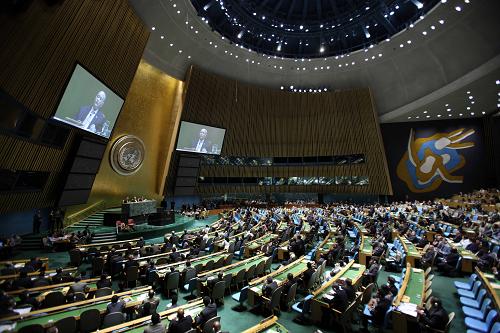 |
|
The UN General Assembly opened the door on Monday. [Xinhua] |
The UN General Assembly opened the door on Monday to expanding the Security Council by calling for full-scale negotiations on adding new members to the United Nations' most powerful body.
After hours of talks that several diplomats involved in nearly collapsed, the assembly unanimously passed a resolution approving "inter-governmental negotiations" on expanding the council to begin by February 28, 2009.
Several UN diplomats described the breakthrough as "historic", saying it greatly increased the likelihood that the council will become larger and more representative of the world of the 21st century.
The process of expanding the council began in 1993 when a UN working group was given the task of drawing up a plan for enlarging the 15-nation body.
But the committee worked on the basis of consensus, something it could never achieve due to disagreements among key members like Italy and Germany.
Even if the inter-governmental negotiations strike a deal on enlarging the council, which has the power to authorize sanctions, trade embargoes and military action, the process of ratification by UN member states will likely take years and there is no guarantee it will succeed.
But diplomats said moving the discussion out of the deadlocked committee early next year and putting it into the hands of the 192 UN member states will capitalize on the widely-held view that an enlargement is long overdue.
"It means that we are now moving from discussion of procedure into discussion of substance," Britain's UN Ambassador John Sawers said.
UN diplomats said that it would not be difficult to get the support of two-thirds of the UN member states needed for approval, provided they can agree on how many seats to add.
One recent proposal which UN diplomats said enjoyed broad support among member states called for adding around seven new members to the council.
Japan's UN Ambassador Yukio Takasu called the assembly's decision "historic". Japan is one of the top candidates for a permanent seat on an expanded council, along with Germany, India, Brazil and an undetermined African nation.
The council now has five permanent veto-wielding members – Britain, China, France, Russia and the United States, considered the victors of World War Two.
Ten rotating nonpermanent members are elected for 2-year terms on a regional basis.
The size of the council has increased once since the United Nations was created in 1945.
In 1965, the number of elected members rose from six to ten.
The main reason for the slow progress in the working group, established in 1993, was that regional rivalries created an impasse that was difficult to break.
Italy opposed Germany's aspirations for a permanent seat, just as Pakistan opposed India and Argentina countered Brazil.
In 2005, a so-called Group of Four – Germany, Brazil, India and Japan – made a strong push to join the council as permanent members, along with two African countries, but without veto rights.
But their bid failed to get enough support as it ran into strong opposition from regional rivals such as Italy, Pakistan and Argentina.
Diplomats said the outgoing president of the General Assembly, Ambassador Sergjan Kerim of Macedonia, played a key role in convincing the working group that the time had come to let go of the issue and allow governments to take over.
(China Daily September 17, 2008)